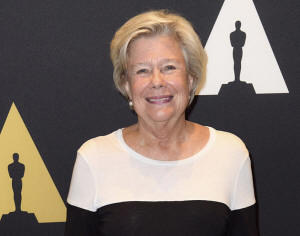Meet the woman behind some of your favorite casts, from ‘The Exorcist’
to ‘Sleepless in Seattle’
 Send a link to a friend
Send a link to a friend
 [November 16, 2024]
By LINDSEY BAHR [November 16, 2024]
By LINDSEY BAHR
Juliet Taylor does not give herself credit for Meryl Streep.
In her over 40 years as top casting director behind so many classics,
“Annie Hall,” “Heartburn” and “Sleepless in Seattle” to name just a few,
she did, technically give Streep her first film role. She gave many
stars their big breaks. But Streep, she said, was always going to happen
— the young stage actor was the talk of the town in New York as soon as
she came on the scene. Taylor was simply the lucky one who happened to
be casting for “Julia,” which didn’t conflict with a play.
Modesty is not antithetical to being a great casting director, though, a
profession of observation, negotiation and nuance that operates mostly
out of the public eye. It’s why Taylor's a little nervous about Sunday,
when she’ll be presented with an honorary Oscar at the film academy’s
annual Governors Awards in a room full of Hollywood greats.
Recognition is long overdue for Taylor and her peers. Earlier this year,
the film academy announced that it would add a new competitive Oscar for
casting directors starting with films released in 2025.
“There’s so much people don’t know about casting actors,” Taylor said.
“One thing is we negotiate all the contracts and we cast a movie within
a budget.”
Casting wasn’t always the art that it is today. In the studio system, it
was more of cattle call, an organizational rather than creative job. But
Taylor began her career in 1968 at time of change, mentored by one of
the pioneers behind the movement: Marion Dougherty, who scouted talent
in off-Broadway plays and turned casting into a more selective, humane
process. It was also a profession led by a lot of women. Dougherty used
to joke that it’s because they didn’t get paid much.

The first movie Taylor led casting on was “The Exorcist,” a baptism by
fire in many ways. Director William Friedkin had not gotten along with
Dougherty on “The Night They Raided Minsky’s" and called the office with
a strange request.
“He said, ‘I hear you have a really good assistant. Would you let her
cast my movie?’” Taylor said. “I don’t know if he did that as something
that was not nice to do. That was terrifying for me. I was scared to
death the entire time.”
But she also found her voice on the film, discovering Linda Blair and
taking a shot on Jason Miller, a playwright who she had a good feeling
about.
“He had such a great face and he was such an interesting kind of
brooding man,” she said. “I thought, ‘Gee let’s see if he’ll come in and
cry.’ He did and he got the part. That was exciting. That’s a casting
director’s dream.”
As a New Yorker, Taylor quickly established herself as a go-to casting
director for the likes of Woody Allen, for whom she cast over 40 films,
Mike Nichols, Nora Ephron and Alan Parker. Among her over 100 credits,
she did both “Close Encounters of the Third Kind” and “Schindler’s List”
for Steven Spielberg, “Taxi Driver” for Martin Scorsese, “Big” for Penny
Marshall and “Terms of Endearment” for James L Brooks.
[to top of second column]
|

This image released by the Academy of Motion Picture Arts and
Sciences shows casting director Juliet Taylor at an event for
"Perfect Choice: the Art of the Casting Director" in Beverly Hills,
Calif., on Wednesday, April 13, 2016. (Todd Wawrychuk/Academy of
Motion Picture Arts and Sciences via AP)
 “So many of them turned out so well
because I worked for such wonderful directors,” she said. “And I
don’t want to sound like I’m being falsely modest, but I do feel
like so many of these people were just so talented you couldn’t miss
it.”
Some of her proudest moments were finding real people to fill out
movies, like the lounge singer in “Broadway Danny Rose.” There are
also the actors who she didn’t give up on.
“I used to drag poor Jeff Daniels in for everything,” she said.
“Back then also there were two different communities of actors and
there was very little intermingling. New York actors came to New
York to be in the theater. If they got a movie, that was thrilling,
but they didn’t come thinking they were going to be a star.”
For the most part, she and her longest running filmmaker partners,
Allen and Nichols, were able to operate independently.
“Woody made his movies on a very tight budget with the agreement
that he wouldn’t be interfered with,” she said. “Mike Nichols was so
admired that people didn’t bother with him too much at first. But as
his movies got more expensive, then you started to see a little bit
more interference.”
When “Working Girl” came along, for instance, the studio had ideas
about needing bigger stars. She and Nichols wanted Alec Baldwin as
the male lead, but he was too unknown for the studio and Harrison
Ford was called in.
Taylor retired a few years ago and doesn't regret it. She’ll still
talk to some of her old director friends about projects here and
there. But she’s mostly just enjoying going to the theater. And
she’s excited that her profession is being celebrated.
“There’ve been so many people who went before us who really deserved
it,” she said. “It’s very moving for me and the whole community.
It’s been too long.”
All contents © copyright 2024 Associated Press. All rights reserved
 |